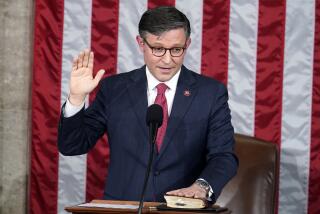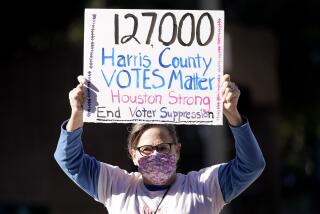Florida Vote Foul-Up Puts Reform Onus on Congress
- Share via
WASHINGTON — As a new Florida election controversy cast a spotlight on congressional inaction, senior lawmakers pledged Wednesday to revive their faltering effort to enact an overhaul of the nation’s voting systems.
All sides agree that the disputed 2000 presidential recount in Florida was Exhibit A in the case for a major federal initiative to make the process of voting simpler and more secure.
Now the state has, on a somewhat smaller scale, served up Exhibit B: a marred gubernatorial primary election.
But whether this second Florida foul-up, centered on Tuesday’s Democratic matchup between Janet Reno and Bill McBride, is enough to push Congress to reach compromise on a bill that would affect every state remains uncertain.
The Republican-led House and Democrat-controlled Senate have both passed versions of a voting reform bill, each by overwhelming margins. Nonetheless, lawmakers have been unable for months to bridge substantial partisan differences on issues such as ways to prevent election fraud.
And in one crucial respect--federal funding--the reform movement has fallen backward. In August, citing budget pressures, President Bush killed $400 million from an appropriations law that Congress had intended to help states begin to upgrade election systems.
Lawmakers from both parties said Wednesday that they would redouble efforts to produce a bill acceptable to both chambers and the president.
“We’re trying to give it a second push. We’re doing everything we can,” said Sen. Christopher S. “Kit” Bond (R-Mo.).
“I’m still hopeful,” said House Minority Leader Richard A. Gephardt (D-Mo.).
Referring to troubles in the McBride-Reno race, he said: “How many times do we have to go through this before we decide that we’re going to help the states and counties do this right?”
Each party lamented the inaction--and blamed the other for it. Advocates for reform, meanwhile, have urged both sides to cut a deal.
“I would certainly hope that what has occurred in Florida would break things loose and get us some movement on election reform,” said Kay J. Maxwell, president of the League of Women Voters. “A solution, or at least a hoped-for solution, has been sitting in Congress, and nobody’s taking any action on it.”
The House last December passed, 362 to 63, a bill that would authorize Washington to send billions of dollars to state and local election agencies. In exchange, the bill sought to spur those agencies to modernize their voting systems, and in particular to phase out the punch-card ballots made infamous during the 2000 dispute between Bush and Democratic presidential candidate Al Gore.
The Senate in April passed, 99 to 1, a bill that would impose a range of national standards on voting systems--for example, requiring better access to polling places for disabled voters and requiring states to offer voters a chance to correct errors.
To win GOP support, the Senate bill also included an anti-fraud provision, written by Bond, that would require certain first-time voters who register by mail to show some form of identification when they vote. The House bill contained no similar provision.
In talks between House and Senate members, the anti-fraud measures have provoked the most debate.
Republicans have accused Senate Democrats of backing off a pledge to support the Bond language.
Democrats, seeking to thwart measures they say might turn legitimate voters away from the polls, question whether House Republican leaders want a bill.
On Wednesday, the two chief House sponsors, Reps. Robert W. Ney (R-Ohio) and Steny H. Hoyer (D-Md.) insisted that the bill remains very much alive. Ney said House Speaker J. Dennis Hastert (R-Ill.) “has a strong will to get this done.”
Hoyer described negotiators as “very energized.” He said agreement had been reached, for instance, on the level of spending the bill would authorize: $3.5 billion over five years.
Such money is expected to go a long way to help states such as California replace punch-card voting machines. Hoyer said a portion of the federal funding could be spent to train poll workers on how to use new systems--evidently a problem Tuesday in some precincts in South Florida.
But as the all-too-familiar scenario in Florida unfolded, some lawmakers warned that Congress could not legislate an end to election controversy.
“As much as I would like to see an election reform bill pass before Congress adjourns for the year,” Sen. Mitch McConnell (R-Ky.) said, “passage of such [a] bill cannot guarantee trouble-free elections in every state.”
More to Read
Get the L.A. Times Politics newsletter
Deeply reported insights into legislation, politics and policy from Sacramento, Washington and beyond. In your inbox twice per week.
You may occasionally receive promotional content from the Los Angeles Times.










